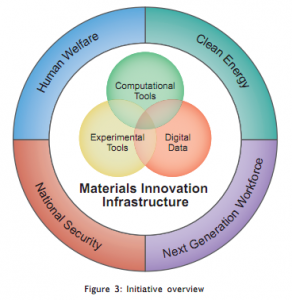NOVEMBER 9, 2011 at Enginner blogs, here
One of the big challenges of engineering is the time it takes to get from innovation to production. This year, President Obama announced theMaterials Genome Initiative for Global Competitiveness, as a joint effort between industry, academia, and several major government agencies. Materials issues are considered critical both to national defense and energy policy. However, the time to get a brand new material from the lab bench to market tends to be measured in decades. This initiative aims to decrease that time by making foundational data more accessible.
Accordingly, one of the major goals of the Material Genome Initiative is to create better open databases for materials information. In biology, with the rise of bioinformatics and data sharing requirements by funding agencies, there are some impressive databases, such as FlyBase and WormBase, each devoted to a particular organism. However, there are a number of challenges that arise when trying to share materials data. One major issue is the highly proprietary nature of many processing techniques. For example, the heat treatment of the undercarriage of Caterpillar equipment is a carefully controlled trade secret, because it provides them a competitive edge.
The National Institute of Standards and Technology (NIST) is in charge of the effort to create reference databases. Some such databases already exist, such as the Ceramics WebBook, which is essentially a database of vetted publications from the literature at large. It will be interesting to see if this new initiative produces more of the same, or if there is a shift towards a handbook style.
I’m excited to see my field getting more attention from the top, but right now, this is a one-year budget item, and may vanish as quickly as it seems to have appeared as science funding gets targeted as an “easy” place to make cuts.
Have you seen similar “initiatives” in your field, either from high-level attention or from other factors outside the norm of your field?

No comments:
Post a Comment